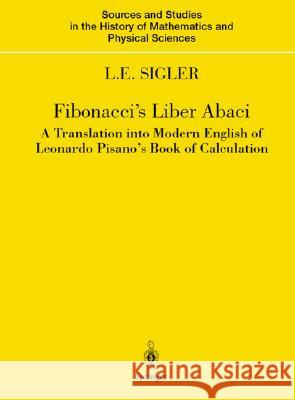Fibonacci's Liber Abaci: A Translation Into Modern English of Leonardo Pisano's Book of Calculation » książka
Fibonacci's Liber Abaci: A Translation Into Modern English of Leonardo Pisano's Book of Calculation
ISBN-13: 9780387954196 / Angielski / Twarda / 2002 / 648 str.
Fibonacci's Liber Abaci: A Translation Into Modern English of Leonardo Pisano's Book of Calculation
ISBN-13: 9780387954196 / Angielski / Twarda / 2002 / 648 str.
(netto: 383,36 VAT: 5%)
Najniższa cena z 30 dni: 385,52
ok. 22 dni roboczych
Dostawa w 2026 r.
Darmowa dostawa!
First published in 1202, Fibonacci's Liber Abaci was one of the most important books on mathematics in the Middle Ages, introducing Arabic numerals and methods throughout Europe. Its author, Leonardo Pisano, known today as Fibonacci, was a citizen of Pisa, an active maritime power, with trading outposts on the Barbary Coast and other points in the Muslim Empire. As a youth, Fibonacci was instructed in mathematics in one of these outposts; he continued his study of mathematics while traveling extensively on business and developed contacts with scientists throughout the Mediterranean world. A member of the academic court around the Emperor Frederick II, Leonardo saw clearly the advantages for both commerce and scholarship of the Hindu positional number system and the algebraic methods developed by al-Khwarizmi and other Muslim scientists. Though it is known as an introduction to the Hindu number system and the algorithms of arithmetic that children now learn in grade school, Liber Abaci is much more: an encyclopaedia of 13th-century mathematics, both theoretical and practical.











